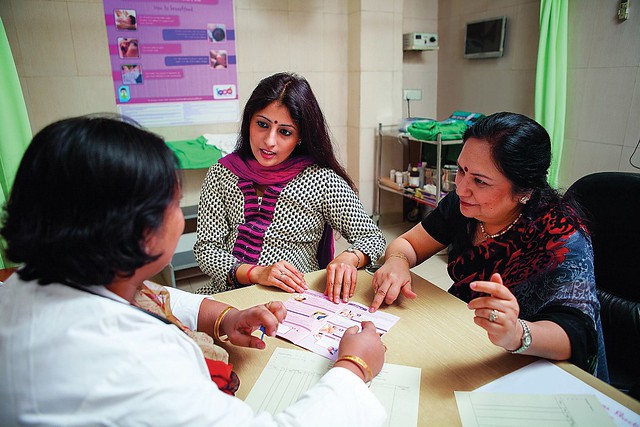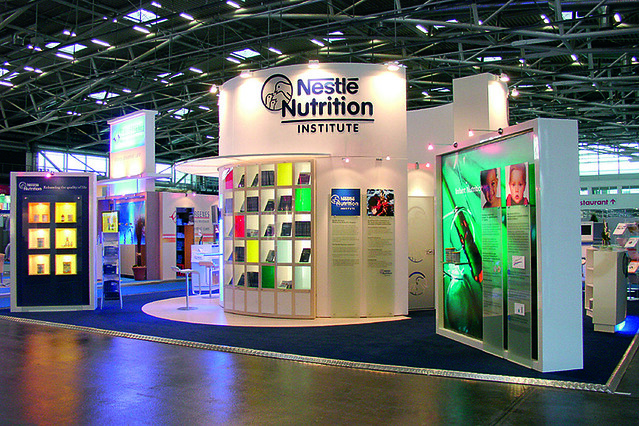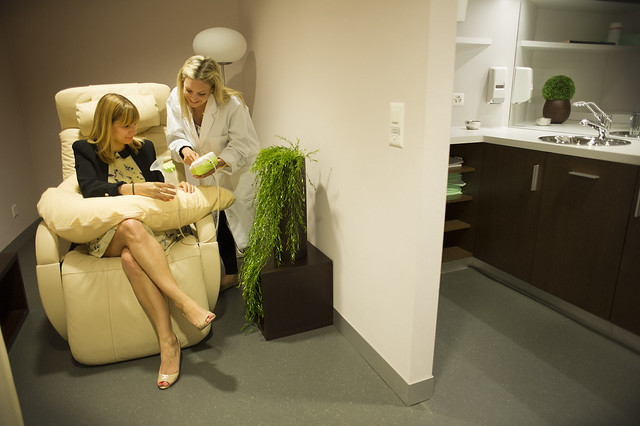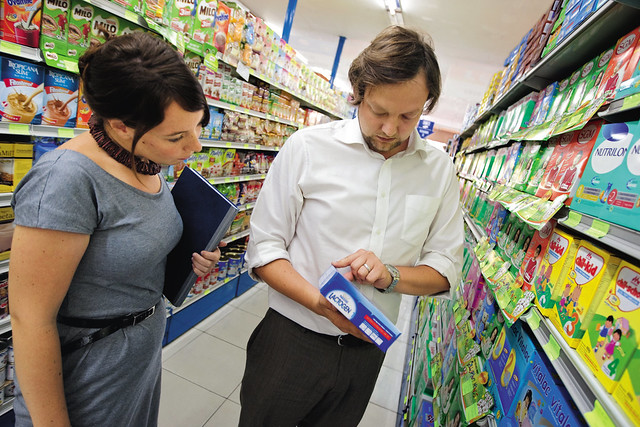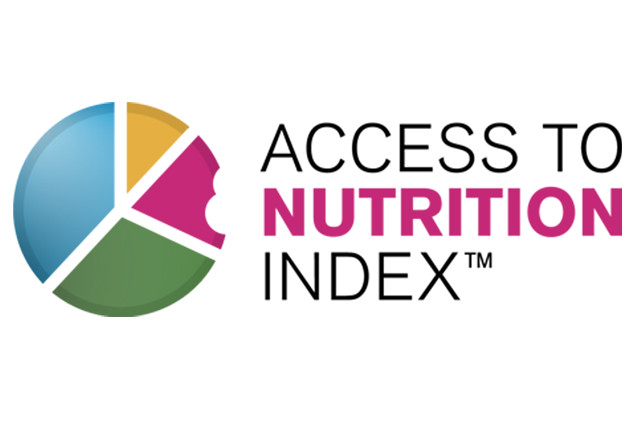How does Nestlé support breastfeeding?
We believe that breastfeeding is best for babies and support the World Health Organization’s recommendation calling for exclusive breastfeeding for the first six months of life, followed by continued breastfeeding along with the introduction of complementary foods as advised by a health care professional or health authority.
We include the wording ‘breastfeeding is best’ whenever and wherever possible and relevant, such as on infant formula packaging and in all communications. We also develop educational materials for health care professionals and parents on the benefits of breastfeeding. We also run campaigns and seminars on breastfeeding for the medical community in partnership with governments and medical institutions.
As a minimum, Nestlé complies with the WHO Code and later WHA Resolutions as implemented by national governments worldwide. We voluntarily apply our own policy when it is stricter than national regulations in 152 countries considered ‘higher risk’ in terms of infant mortality and malnutrition. In these countries, we also specify that children should only be fed complementary foods from six months.
Nestlé also has robust compliance measures and mechanisms, including a network of internal WHO Code Ombudspersons. We are proud to be the first BMS manufacturer included in the FTSE4Good Index and have consistently achieved its rigorous criteria for responsible BMS marketing since 2011.
In 2018, Nestlé ranked second in the 2018 Global Access to Nutrition Index’s sub-ranking of BMS manufacturers. We report transparently on our progress in our annual report and on our corporate website, and encourage stakeholders to share any concerns they may have on our BMS marketing practices through our ‘Speak Up’ system.
Nestlé investigates all concerns raised, and quickly addresses any instances of non-compliance reported to us.
How do we guarantee the overall quality and nutrition of infant formula?
Our focus on quality is consistent from the farm to the factory up through to the moment it reaches your little one.
The milk that forms the basis of our formula milks is stored in cooling tanks to ensure it is used at the peak of freshness. It is transported in insulated stainless-steel tanks, which keeps it fresh and healthy. Once at our factory, it undergoes up to 500 different checks for contaminants and antibiotics. To prevent harmful microorganisms that grow in wet environments, our powder formulas are made in completely dry areas. The production area is also carefully cleaned to avoid contaminative moisture and even the air conditioner works with special filters to reduce humidity in the air. These controlled processes along with constant monitoring, ensure our formulas remain in the same conditions from the moment they are made.
In tandem, our 600 Nestlé researchers and close partnerships with academic organizations are continuously using the latest discoveries to refine and enhance our formulas, keeping in mind that breastmilk is the absolute gold standard that will never be replicated. Their developments are rooted in an ever-evolving understanding of breastmilk, its benefits and how formulas can contain the proteins, minerals and other components to bring infants an optimal alternative. These undergo clinical trials with leading independent institutions around the world to validate their safety and quality – so that ultimately, we can confidently support babies’ growth and development, whenever mums cannot or decide not to breastfeed.
Careful production and processing are critical to upholding our high product standards. This eye for quality continues when we consider our packaging and ultimate consumer use. formula is packed and sealed in containers to protect the freshness, flavor and nutritional value until it reaches your home. Easy-to-understand labels always provide specific, clear instructions on our packaging for how to use, prepare and store it. These directions help parents and caregivers feed their baby their formula in the safest way possible. Our packaging and labels play a critical role ensuring our formulas are used at the right age — so your little one gets exactly what they need, when they need it.
How is Nestlé working to continually improve our responsible practices?
The most effective way to level the playing field so the private sector operates within the same framework, is to secure WHO Code compliance through well-drafted and well-implemented legislation in all countries.
Moreover, we gave careful thought to the Call to Action and made a pledge aimed at stimulating commercial change where regulation doesn't exist like in the U.S., Canada and Japan. Our response to the Call to Action (CTA) makes a number of unilateral commitments, which add up to a big commercial impact. It also sent a strong message to our industry colleagues that real change happens when our industry as a whole makes meaningful progress.
Our advocacy efforts support an evidence-based approach to policy making, respecting independent, peer-reviewed science. This was reiterated in our CTA response, where we noted our support for regulating promotion of infant formula for babies up to 12 months of age globally, and our desire to engage with stakeholders to advocate for WHO Code adoption. We also committed to strengthen our advocacy practices in line with the Responsible Lobbying Framework.
Has Nestlé lobbied to oppose breastfeeding policies?
We strongly support breastfeeding and have not wavered on this position. We have not, nor would we ever, lobby any governments - including the U.S. government - to oppose breastfeeding policies anywhere in the world.
We believe that breastfeeding is best for babies. Full stop. We will continue promoting exclusive breastfeeding for the first six months of life, followed by the introduction of adequate nutritious complementary foods along with sustained breastfeeding, up to two years of age and beyond. Where mothers cannot or choose not to breastfeed, we believe infant formula provides an important alternative. We continue our commitment to responsibly and compliantly offer products to support mothers who need or choose an alternative to breastfeeding.
Changing Markets Foundation report – Nestlé’s response
We invited CMF to discuss its 2018 ‘Busting the Myth report’ on Nestlé’s commitment to infant nutrition science with us, to allow us to clarify some of the inaccuracies in the findings.
Where mothers cannot, or chose not, to breastfeed, infant formula is the only suitable breast-milk substitute. CMF recognizes the vital role that infant formula plays in such cases, and we welcome this.
We agree that formula manufacturers have a responsibility to provide products that are safe and as nutritionally complete as possible, backed by the best science. 600 Nestlé researchers are working to this end, in partnership with academic organizations.
CMF criticizes on pack statements in the U.S., Hong Kong, Switzerland and Spain, but these comply with local regulatory requirements. We do not use any statements on infant formula products or in other communications that idealize such products, or imply they are superior or equivalent to breastmilk.
Modern formulas are compositionally closer to human milk, so we do state that their ingredients are ‘inspired by breastmilk’ or contain components that are comparable to those in breastmilk – like proteins or human milk oligosaccharides (HMOs), when this is scientifically proven.
This does not breach the WHO Code as implemented by national governments or our own stringent policy when it is stricter than the national code.
Ingredients are another focus of the CMF report. Here CODEX standards and local regulations (which may vary from country to country) determine the essential ingredients needed in infant formula. All our products meet these requirements.
Contrary to what the report states, we do not use sucrose in any infant products (0-6 months), and voluntarily removed sucrose from all other follow-on formulas (6-12 months) by the end of 2018.
Vanilla flavoring is safe and permitted for infants above 6 months of age, according to CODEX. It is present in a very limited number of products for this age range, and is not in our infant formula products in South Africa. We are voluntarily removing such flavorings from the few products that still contain them.
CMF’s follow-up 2019 report ‘Busting the Myth’ made many of the same arguments.
We do not idealize our products or imply they are superior or equivalent to breastmilk. However, modern formulas are compositionally closer to human milk than cow’s milk, for example. As such, we say that our products are ‘inspired by breastmilk’.
Hong Kong law allows promotional activities for growing-up milks (criticized in the report) and our own policy on BMS marketing. Finally, many factors determine the local pricing of Nestlé products – including import duties, local taxes, production costs and distribution and trade margins.





